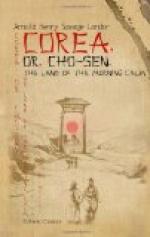The man, or rather the scarecrow, for he hardly had any more the resemblance to a human being, hearing the noise of the crowd that was round me, moved in my direction. He staggered and dragged himself till he got quite close, then bending his trembling head forward, made the utmost efforts to see, just as a bat does when taken out into the daylight. Poor fellow! he was also very nearly blind. His efforts to speak were painful beyond measure. A hoarse sound like the neighing of a pony was all that came out of his throat, and each time he did this, shrieks of laughter rose from the crowd, while comical jokes and sarcastic remarks were freely passed at the thinness of his legs, the condition of his skin, and the loss of the lower half of his face. Oh! it was shocking and revolting, though it must be said for them that the same people who chaffed him were also the first ones to fill his little pot with cash.
Now, you must not think that I have told you this story to make your hair stand on end, for that is not my intention at all; but simply to prove to you the anomaly that a Corean is not really cruel when he is cruel, or rather when he appears to us to be cruel. This sounds, I believe, rather extraordinary to people who cannot be many-sided when analysing a question, but what I mean is this: It must not be forgotten that different people have different customs and different ways of thinking; therefore, what we put down as dreadful is often thought a great deal of in the Land of the Morning Calm.
“Why not laugh at illnesses, death, and deformity?” I once heard a Corean argue.
“It does not make people any better if you sympathise with them; on the contrary, by so doing you simply add pain to their pain, and make them feel worse than they really are. Besides, illnesses help to make up our life, and it is our duty to go through them as merrily as through those other things which you call pleasures. We people of Cho-sen do not look upon illnesses, accidents, or death as misfortunes, but as natural things that cannot be helped and must be bravely endured; what better, then, can we do than laugh at them?”
“So your argument is,” I dared put in, “that if one may laugh at one’s own misfortunes, there is all the more title to laugh at those of other people?”
“That is so,” retorted the man of Cho-sen, with an air of self-conviction.
I at once agreed with him that I did not find much real harm in laughing at other people’s misfortunes, except that if it did not do anybody any harm, it neither did them any good; but I acknowledge that it took me some minutes before I could make up my mind as to one’s own misfortunes. In the end, however, I had to agree with him even about this point. He proved to me that Coreans are at bottom very good-hearted and unselfish, and always ready to help relations and neighbours, always ready to be kind even at their own discomfort. This good-nature, however, lacks




